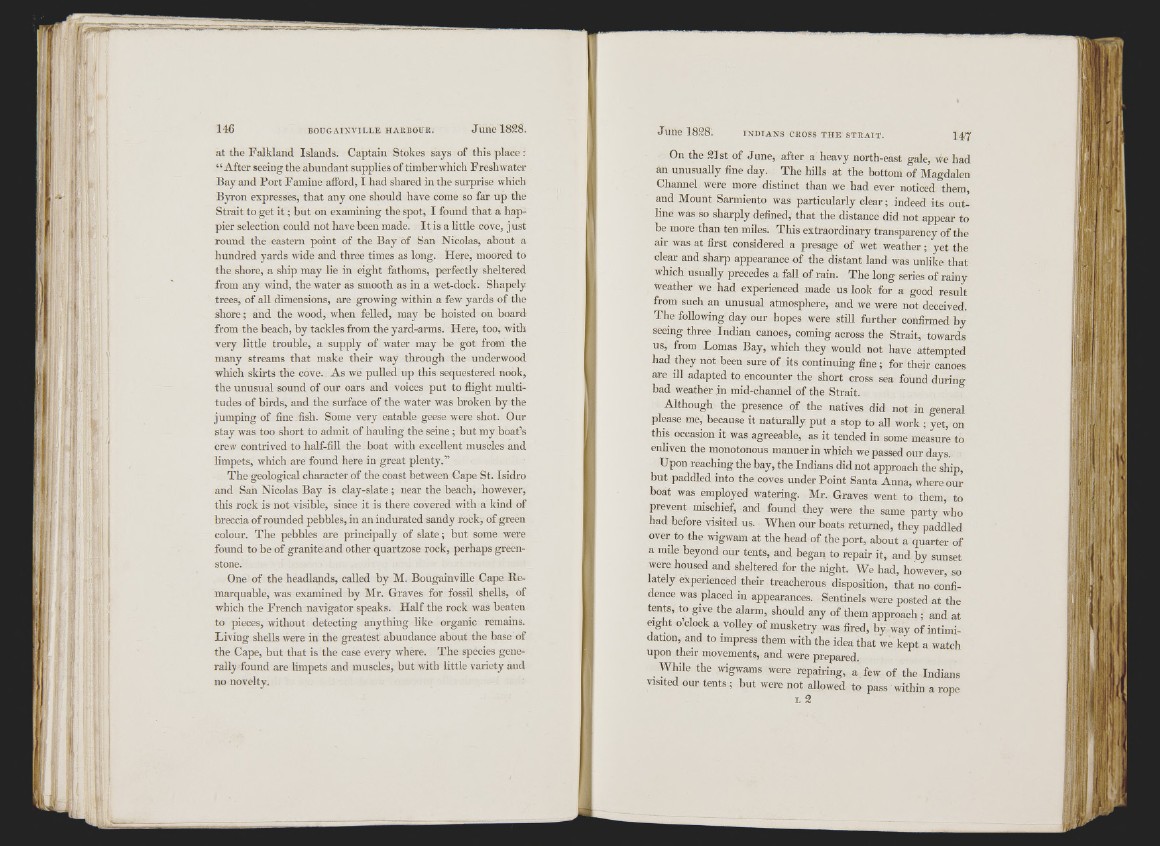
' i
I ; 'i i
146 BOUGAINVILL E HAEBOUB.
at the Falkland Islands. Captain Stokes says of tliis place :
“ After seeing the abundant supplies of timber which Freshwater
Bay and Port Famine afford, I had shared in the surprise which
Byron expresses, that any one should have come so far up the
Strait to get i t ; but on examining the spot, I found that a happier
selection could not have been made. It is a little cove, j ust
round the eastern point of the Bay of San Nicolas, about a
hundred yards wide and three times as long. Plere, moored to
the shore, a ship may lie in eight fathoms, perfectly sheltered
from any wind, the water as smooth as in a wet-dock. Shapely
trees, of all dimensions, are gTOwing within a few yards of the
shore; and the wood, when felled, may be hoisted on board
from the beach, by tackles from the yard-arms. Here, too, with
very little trouble, a supply of water may he got from the
many streams that make their way through the underwood
which skirts the cove. As we pulled up this sequestered nook,
the unusual sound of our oars and voices put to flight multitudes
of birds, and the surface of the water was broken by the
jumping of fine fish. Some very eatable geese were shot. Our
stay was too short to admit of hauling the seine ; but my boat’s
crew contrived to half-fill the boat with excellent muscles and
limpets, which are found here in great plenty.”
The geological character of the coast between Cape St. Isidro
and San Nicolas Bay is clay-slate; near the beach, however,
this rock is not visible, since it is there covered with a kind of
breccia of rounded pebbles, in an indurated sandy rock, of green
colour. The pebbles are principally of slate; but some were
found to be of granite and other quartzose rock, perhaps greenstone.
One of the headlands, called by M. Bougainville Cape Ee-
marquable, was examined by Mr. Graves for fossil shells, of
which the French navigator speaks. Half the rock was beaten
to pieces, without detecting anything like organic remains.
Living shells were in the greatest abundance about the base of
the Cape, but that is the case every where. The species generally
found are limpets and muscles, but with little variety and
no novelty.
On the 21 st of J une, after a heavy north-east gale, we had
an unusuaUy fine day. The hills at the bottom of Magdalen
Channel were more distinct than we had ever noticed them,
and Mount Sarmiento was particularly clear; indeed its outline
was so sharply defined, that the distance did not appear to
be more than ten miles. This extraordinary tran,sparency of the
air was at first considered a presage of wet weather; yet the
clear and sharp appearance of the distant land was unlike that
which usually precedes a fall of rain. The long series of rainy
weather we had experienced made us look for a good result
from such an unusual atmosphere, and we were not deceived.
The following day our hopes were still further confirmed by
seeing three Indian canoes, coming across the Strait, towards
us, from Lomas Bay, which they would not have attempted
had they not been sure of its continuing fine; for their canoes
are ill adapted to encounter the short cross sea found during
bad weather in mid-channel of the Strait.
Although the presence of the natives did not in general
please me, because it naturally put a stop to aU work ; yet, on
this occasion it was agreeable, as it tended in some measure to
enliven the monotonous manner in which we passed our days.
Upon reaching the bay, the Indians did not approach the ship,
but paddled into the coves under Point Santa Anna, where our
boat was employed watering. Mr. Graves went to them, to
prevent mischief, and found they were the same party who
had before visited us. When our boats returned, they paddled
over to the wigwam at the head of the port, about a quarter of
a mile beyond our tents, and began to repair it, and by sunset
were housed and sheltered for the night. We had, however, so
lately experienced their treacherous disposition, that no confidence
was placed in appearances. Sentinels were posted at the
tents, to give the alarm, should any of them approach ; and at
eight o clock a volley of musketry was fired, by way of intimidation,
and to impress them with the idea that we kept a watch
upon their movements, and were prepared.
While the wigwams were repairing, a few of the Indians
visited our teuts; but were not allowed to pass within a rope